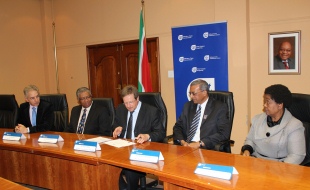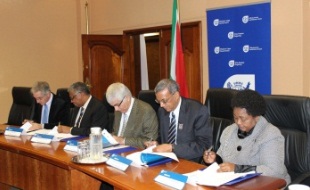
News
Western Cape Government Signs Multilateral Agreement for Health Professionals
A historic multilateral agreement was signed on 29 May between the Western Cape Government and the universities in the province that train health workers.
The multilateral agreement is between Western Cape Government and the University of Stellenbosch, University of Cape Town, University of the Western Cape and the Cape Peninsula University of Technology. All four of the higher education institutions are involved in the training of future health workers and health research.
On assuming office in 2009, the Western Cape Minister of Health, Theuns Botha, committed to finalising this agreement which has been a bone of contention for several decades. "Today's signing ceremony is a highlight of my term of office," said Minister Botha. "The agreement is of national significance because the health services are where national health and higher education must work together. This agreement is the bridge toward this essential co-operation."
Previous attempts over the past 20 years to review the current agreements were unsuccessful. Over the past eight years, senior representatives from the Western Cape Department of Health and each of the universities, supported by legal representatives, worked to achieve the consensus reflected in the agreement signed today.
The multilateral agreement is an overarching agreement setting out the principles and definitions of agreements between the Western Cape Government and each of the four universities. This will be followed by bilateral agreements between each university and the Western Cape Government.
Why is an Agreement Necessary?
An agreement is required to govern the relationship between government and the institutions that prepare health science students for clinical practice. These students require hands-on clinical exposure during undergraduate and postgraduate training. Undergraduate and postgraduate students spend about 5.6 million student hours in hospitals. The public health service platform offers a wide spectrum of common and unique conditions, as well as the required patient numbers. Access to these service platforms needs to be governed to protect the patient and the integrity of the service platform.
The relationship between the public health service and the higher education institutions will continue as long as health sciences students need to be trained. The relationship, however, needs to be governed due to resource limitations and finding a balance to deliver two mandates - academic activities and service delivery. The sharing of resources requires clear arrangements for proper accounting.
How Does the Joint Staff System Currently Work?
The Western Cape Department of Health provides the service platform for teaching, training and research. At present, both employees of the department and the universities are involved in these functions. The department and the institutions appoint staff, but the recruitment and selection is a co-operative process. The employee's conditions of service, and disciplinary processes, depend on whether they are appointed by the department or the university.
At present, the Western Cape Department of Health holds the mandate for clinical service delivery, and the universities the mandate for teaching and research.
The Multilateral Agreement
The multilateral agreement covers a range of clarifying definitions, principles and processes that will govern the relationships between the Western Cape Government and the four Institutes of Higher Education.
Ultimately, it provides mechanisms ensuring the parties together provide future health professionals who have received excellent and relevant training, where student and research access is ensured whilst patient rights and patient safety are respected.
The agreement in particular provides for staff who can execute academic and service delivery responsibilities in a balanced manner. It provides for the governance or oversight structures at a multilateral as well as a bilateral level.
The Way Forward
Within the next year, revised bilateral agreements will be developed between Western Cape Government and each of the universities.
The multilateral overarching governance structure, the Joint Advisory Governance Council (JAGC), will have its inaugural meeting on 29 May 2012. Decisions will be taken on various matters, including the way forward, finances and equitable student access.
Members of the Joint Agreement Governance Council (JAGC), which will meet at least annually, are:
- Western Cape Minister of Health, Theuns Botha - chairperson.
- Vice-Chancellor UCT, Dr Max Price.
- Vice-Chancellor US, Prof Russell Botman.
- Acting Vice-Chancellor UWC, Prof Ramesh Bharuthram.
- Vice-Chancellor CPUT, Prof Lineo Mazwi-Tanga.
- Western Cape Head of Health, Prof Craig Househam.
- Deputy Director General Specialised and Emergency Services, Dr Beth Engelbrecht.
- Deputy Director General District Health Services and Health programmes, Dr Joey Cupido.
- Faculty of Health Science Deans: UCT: Prof Marian Jacobs; US: Prof Jimmy Volmink; UWC: Prof Yusuf Osman and CPUT: Prof Dhiro Gihwala.
Hélène Rossouw
Spokesperson for Minister Botha
Tel: 021 483 4426
Cell: 082 771 8834
E-mail: helene.rossouw@pgwc.gov.za





